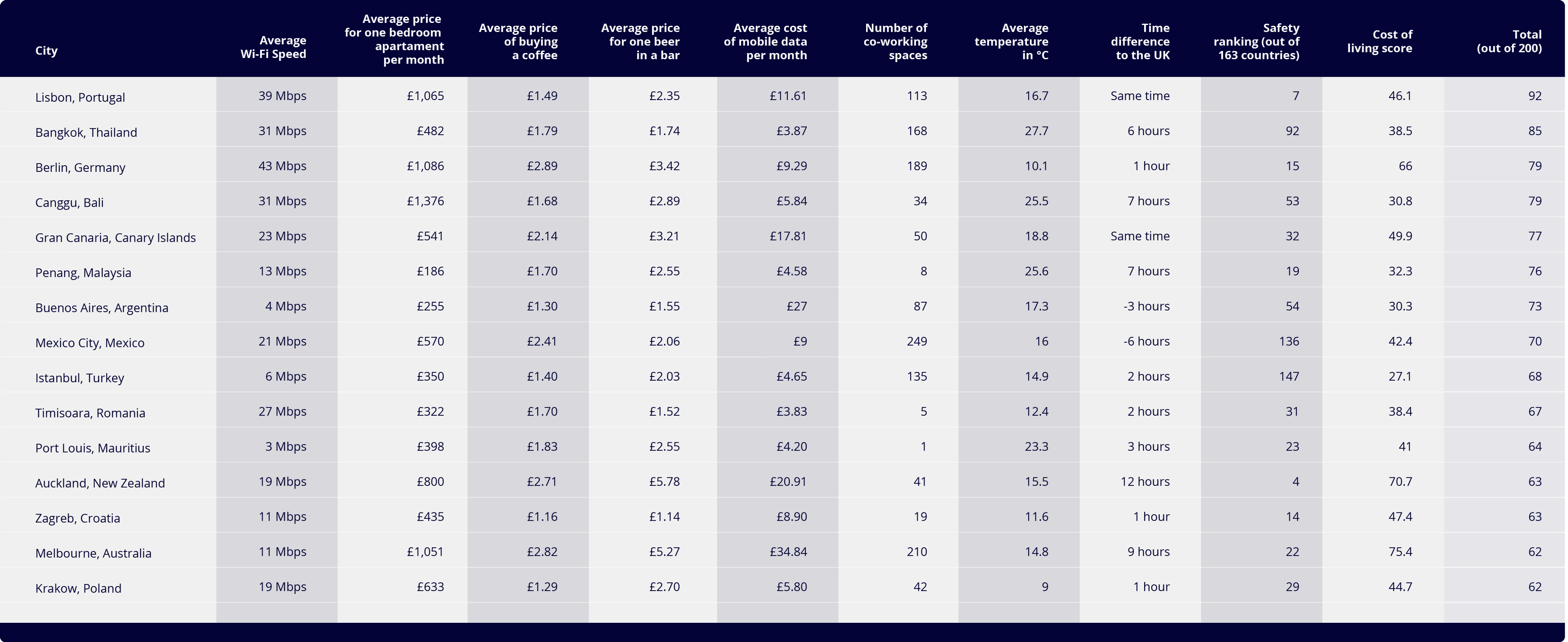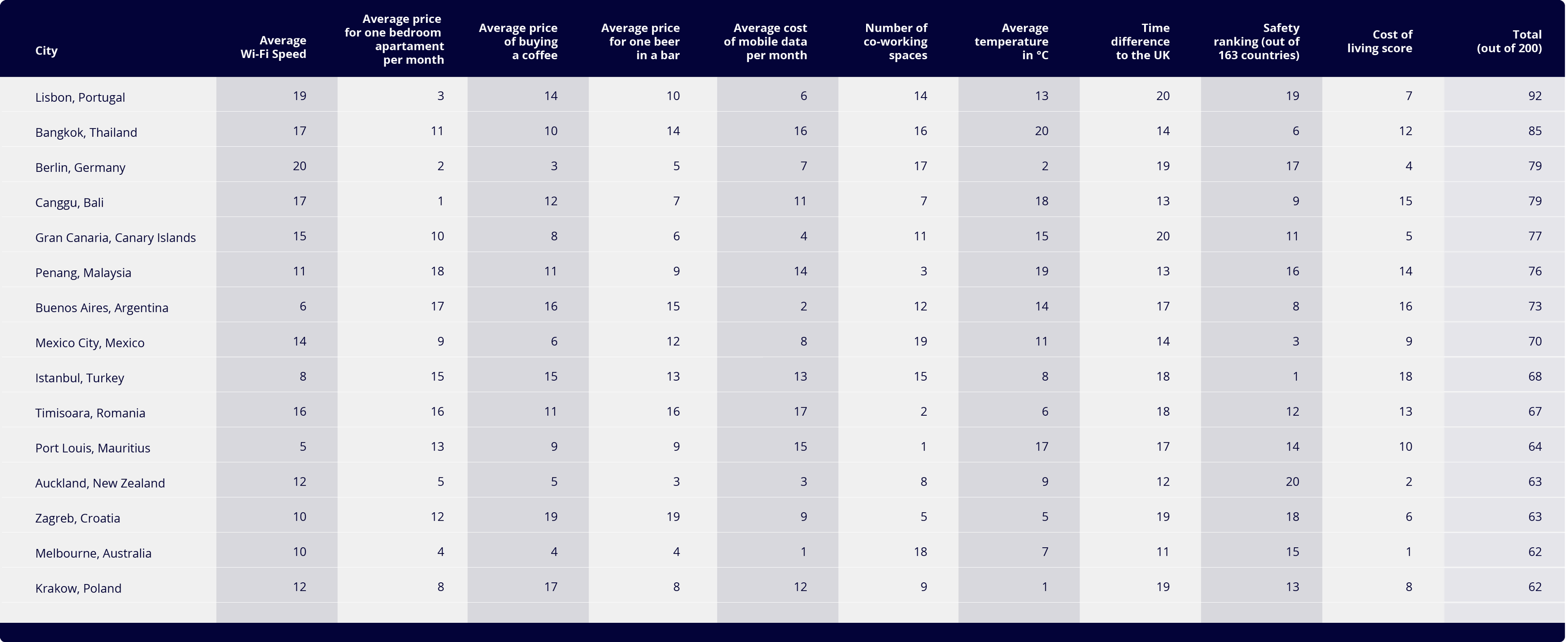The Top Destinations for Digital Nomads

The way we work has seen a revolution in the past few years. Traditional office boundaries are blurring, and the concept of working remotely has emerged as a preferred option rather than an alternative. This preference for remote work isn't a fleeting trend, but rather a substantial shift which can be confirmed by data and research.
In 2023, Buffer's State of Remote Work study found that an overwhelming 91% of respondents preferred working remotely, citing flexibility as the top perk. Similarly, a comprehensive survey conducted by McKinsey in 2022 involving 25,000 employees from various businesses identified the desire for flexible work environments as the third most important reason people seek new jobs, trailing only better pay/hours and career advancement opportunities. The value placed on remote work is so substantial that a staggering 87% of respondents affirmed they would seize the opportunity to work remotely if offered.
Emerging from this shift is a new breed of professionals known as Digital Nomads. These are individuals who use technological advancements to perform their roles virtually anywhere on the globe. This nomadic lifestyle is increasingly becoming the norm as businesses adapt to remote work policies and more than 58 countries offer Digital Nomad visas.
With these developments in mind, our research delves into the best locations across the globe for Digital Nomads. We consider various crucial factors such as the availability of Digital Nomad visa schemes, co-working spaces, travel accessibility, lifestyle perks, the local social atmosphere, and critically, the cost of living. This exploration aims to assist those eager to embrace the nomadic lifestyle in choosing a locale that perfectly balances their work commitments, personal preferences, and financial considerations.
The Rising Cost of Living in the UK Fuels a Shift Towards the Digital Nomad Lifestyle
Over the past decade, the United Kingdom has witnessed a relentless surge in the cost of living. According to the Office for National Statistics (ONS), inflation rates have consistently hovered above the Bank of England's target of 2%, with housing prices in London alone escalating by approximately 62% between 2010 and 2020. Rent prices have followed a similar trajectory, with the average monthly rent in the capital rising by 36% over the same period. Even basic groceries have seen a 20% increase, as reported by the UK's Consumer Price Index (CPI).
In response to these pressures, a growing segment of the UK population is embracing the digital nomad lifestyle, a trend that has been facilitated by advancements in remote working technologies and the global shift towards more flexible work arrangements. The term “remote jobs” is now searched for over 18,000 times per month in the UK on Google – a 410% increase over the last 5 years. Recent surveys indicate that up to 16% of UK employees now exclusively work from home, a number that is projected to rise as the appeal of the digital nomad lifestyle continues to grow. Many of these individuals are opting to relocate to countries with a more favourable cost of living, such as Thailand, Portugal, or Mexico, where they can maintain their employment with UK-based companies and enjoy a higher quality of life for a fraction of the cost.
Yet, this trend is not without its challenges. Issues related to taxation, visa regulations, healthcare, and a lack of social support structures in foreign countries have emerged as potential obstacles for digital nomads. Furthermore, the very nature of this lifestyle necessitates a level of career stability and technological savviness that may not be accessible to all.
The Benefits of Working Remotely
The transition towards remote work has revealed an array of benefits for employees and organisations alike, offering an extensive array of potential advantages that extend far beyond mere convenience. One of the most immediate perks of remote work is the inherent flexibility it provides. This grants individuals control over their schedules, obliterating hours spent commuting and allowing them to tailor their workflow according to their peak productivity periods and personal commitments. This flexibility can lead to a better work-life balance, with employees having more time for personal development, hobbies, and family.
When we marry remote work with the digital nomad lifestyle, however, these benefits are amplified and diversified. Digital nomads are remote workers who carry their careers on the road, harnessing technology to work whilst travelling and living as contemporary nomads. They leverage the flexibility of remote work to quench their thirst for exploration and novel experiences. This geographical freedom offers exposure to diverse cultures, traditions, and landscapes, promoting a greater understanding of the world, broadening perspectives, and bolstering adaptability and problem-solving skills - highly prized in today's swiftly evolving, globalised market.
Furthermore, the digital nomad lifestyle can contribute to higher levels of job satisfaction and well-being. The opportunity to break from the monotony of traditional office life and to couple professional responsibilities with personal passions can alleviate burnout and foster a more holistic approach to life and work. The increased autonomy and self-determination that come with being a digital nomad can enhance motivation and productivity, fostering a sense of fulfilment and engagement in one's work.
Finally, from an organisational perspective, embracing remote work and the digital nomad lifestyle can broaden the talent pool, as geographical restrictions in their hiring processes do not constrain companies. This opens the door to a wealth of skills, experiences, and cultural competencies that can enhance team dynamics, innovation, and competitiveness.
Whilst it's not a lifestyle that suits everyone, for those with a desire for freedom, exploration, and personal growth, the fusion of remote work and the digital nomad lifestyle can offer a vibrant, fulfilling way to harmonise professional commitments with a quest for adventure and discovery.
The Best Locations to be a Digital Nomad
While the life of a digital nomad might seem to be in constant motion, surprisingly, the average digital nomad often stays in a single city for approximately 66 days or roughly two months. This may seem like a short time to truly soak in a city's culture, but it's actually a carefully chosen period that allows them to strike a perfect balance. These two months offer enough time to immerse oneself in the city's lifestyle, explore its hidden corners, and adapt to local customs, while also maintaining the dynamic lifestyle that draws many to digital nomadism in the first place. The two-month time span also helps to prevent "travel burnout" and provides a manageable schedule for work responsibilities.
With this lifestyle in mind we have conducted an in-depth study on the best locations for digital nomads. Understanding the uniqueness of the digital nomad lifestyle and the specific requirements that come with it, Penfold considered a broad range of variables to provide a comprehensive guide for these modern wanderers.


Lisbon, Portugal
Lisbon emerges as the most desirable destination for digital nomads, combining a robust average Wi-Fi speed of 39 Mbps with a pleasant climate and 113 co-working spaces. Its moderate living costs, high safety ranking, and alignment with UK time make it an adaptable choice for digital workers across different professions. Lisbon's cultural richness adds to its overall allure, making it a vibrant and well-rounded digital nomad hub.
Bangkok, Thailand
Bangkok offers an enticing mix of affordability and liveliness, standing out for its very reasonable living costs and a wide array of 168 co-working spaces. The city's adequate Wi-Fi speed of 31 Mbps supports the digital lifestyle, while the warm climate provides a tropical allure. Although the safety ranking is lower, Bangkok's bustling community and rich cultural experiences make it an attractive option for budget-conscious and adventurous digital nomads.
Berlin, Germany
As one of Europe's leading tech cities, Berlin boasts the best Wi-Fi speed at 43 Mbps and offers an extensive array of 189 co-working spaces. Its living costs are on par with some Western European cities, and its safety ranking is impressive. Berlin's cooler climate and one-hour time difference to the UK make it an excellent choice for digital nomads seeking a dynamic and innovative environment, rich in art, history, and technology.
Canggu, Bali
Canggu provides a unique tropical experience for digital nomads but at a higher living cost. With an adequate Wi-Fi speed of 31 Mbps and limited co-working spaces, Canggu may appeal more to those seeking a relaxed lifestyle rather than a bustling digital community. Its tropical climate and unique Balinese culture can provide a refreshing backdrop for creativity and work-life balance, making it suitable for those prioritising lifestyle over pure work efficiency.
Gran Canaria, Canary Islands
Gran Canaria offers a balanced option with affordable living costs, a pleasant mild climate, and a reasonable number of co-working spaces. Its lower Wi-Fi speed of 23 Mbps may not suit those requiring high-speed connectivity but may suffice for general digital work. The absence of a time difference with the UK adds convenience for business communication. Gran Canaria's scenic landscapes and outdoor opportunities make it an attractive destination for digital nomads seeking both work efficiency and recreational experiences.
Penfold commentary
“The digital nomad lifestyle represents a new horizon in how we approach work and life. As we've found in our research, it's about more than just remote work; it's about leveraging technology to unlock a world of geographical freedom, cultural exploration, and personal growth. From Lisbon's appeal as the top destination to the growth of co-working spaces and specialised visas, we're witnessing a significant shift towards a balanced, fulfilling way of living that couples professional responsibilities with a quest for adventure and discovery. This isn't just a trend; it's a movement that's redefining what it means to work in the 21st century.”
Pete Hykin, Penfold Co-CEO and Co-Founder